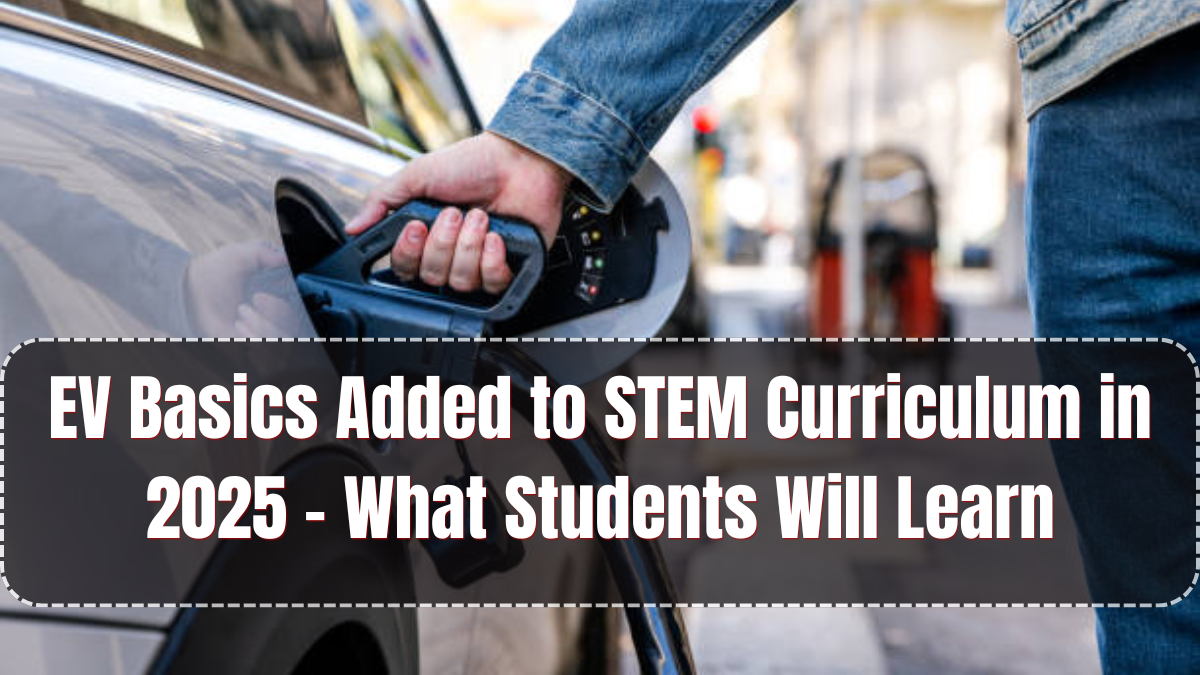In an innovative shift to align school education with emerging green technologies, the Indian government has added Electric Vehicle (EV) basics to the STEM curriculum for Classes 9 to 12 starting in 2025. The move comes in response to the growing demand for clean mobility and the need to equip future generations with relevant technical knowledge and environmental awareness.
With India’s electric vehicle market expanding rapidly, introducing foundational concepts of EVs into school science and technology courses aims to prepare students early for green careers and responsible tech use.

Key Concepts Covered in the EV Syllabus
The new curriculum has been designed to offer a theoretical and practical understanding of how electric vehicles work, their advantages, and their role in a sustainable future. Some of the key topics include:
-
Basic Structure of an Electric Vehicle
Students will learn about the major EV components such as motors, batteries, control systems, and powertrains. -
Types of EVs and Charging Systems
Coverage includes battery-electric vehicles (BEVs), hybrid EVs, and plug-in hybrids, along with how public and home charging systems operate. -
Advantages Over Traditional Vehicles
Lessons compare fuel efficiency, emissions, long-term cost savings, and environmental impact of EVs vs petrol/diesel vehicles. -
Introduction to Battery Technology
Students explore lithium-ion battery construction, charging cycles, safety protocols, and thermal management. -
Greenhouse Gas Emissions & Clean Energy
The curriculum promotes awareness about carbon footprints, renewable energy sources, and India’s carbon neutrality goals.
How It Will Be Taught
The EV content will be integrated into existing Physics, Chemistry, and Technology syllabi rather than as a standalone subject. Teaching methods include:
-
3D animated models of EV engines and battery systems
-
Hands-on classroom projects, like building small battery-powered vehicles
-
Field trips to EV charging stations or auto expos
-
Guest sessions from automotive industry experts and clean energy advocates
Textbooks will be revised in 2025 to include EV-specific chapters, and teachers are undergoing dedicated training through CBSE and NCERT-supported workshops.
Government’s Long-Term Educational Strategy
This educational reform is part of India’s broader Skill India and National Electric Mobility Mission (NEMMP) goals. By introducing EV knowledge at the school level, the government intends to:
-
Build technical confidence in students to explore careers in EV engineering, battery tech, or clean energy
-
Create a culture of environmental responsibility from an early age
-
Support the Make in India initiative through home-grown talent in green mobility solutions
This strategy also aligns with India’s commitment to reduce vehicle emissions and dependence on fossil fuels over the next decade.
FAQs
Is EV education now mandatory for all schools?
Yes, CBSE and several state boards have made it mandatory for all affiliated schools from Class 9 onward.
Are there any exams for this topic?
Yes, EV-related questions will be included in regular STEM subject exams such as Physics or General Science.
Will private schools also follow this curriculum?
Yes, the directive applies to both government and private schools under recognized boards.
Are there practical kits provided?
Some schools will receive EV model kits or small electronic parts for student experiments, especially under the Atal Innovation Mission.
Can students take EV projects to science fairs?
Absolutely! Students are encouraged to showcase EV innovations, mini models, and posters in school exhibitions and national-level competitions.
Click here to know more.
